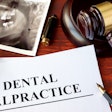
Your office may be prepared for malpractice claims from patients, but what about legal claims from your employees? You can protect yourself from personnel-related legal claims with a few simple practices.
Attorney Arthur Curley and Ruchi Sahota, DDS, discussed how to establish effective hiring and performance review practices and other scenarios in a risk management presentation at the recent California Dental Association's CDA Presents 2016 conference in San Francisco. They also discussed the importance of implementing appropriate controls in the office that prevent employment claims from being filed.
Curley is an assistant professor of dental jurisprudence at the University of the Pacific Arthur A. Dugoni School of Dentistry in San Francisco. Dr. Sahota is a consumer advisor for the ADA and a clinical instructor at the Dugoni School of Dentistry.
Although malpractice claims are still the No. 1 lawsuit filed against dentists, employment claims such as wrongful termination are a growing trend, according to Curley.
And since dental practices usually have small staffs that have worked together for years, dentists and their employees often feel like they're part of a family, Curley noted. So when problems with staffers erupt, it can be traumatic for everyone.
"When somebody in-house has a problem, it's like a divorce," Curley said.
Don't ignore the basics
To avoid problems, Curley stressed the importance of doing a background check on prospective employees before interviewing them. Dentists should look for red flags such as unexplained gaps in employments and frequent job changes. References should be checked and documented, he advised.
"One of the best things to check is their Facebook page," he said, noting that one woman's disturbing social media nickname was "Amphetamine Annie."
If someone calls to check the record of employees, employers only have to give the start and end dates of employment, Curley said. Employers should be careful about giving assessments of employees, but they can say "no comment" if pressed about recommendations.
Asking prospective employees if they are pregnant or plan to have children is illegal, Curley noted. Employees can quit and seek unemployment benefits, claiming a hostile work environment.
"Questions themselves can be considered hostile, creating a discriminating atmosphere," he said.
When staffers become pregnant, employers are required to get medical clearance for them to ensure they can perform potentially harmful duties, such as administering nitrous oxide and taking x-rays, Curley said. Pregnant women and new mothers are entitled to take four months maternity leave without pay, and their jobs must be held open for them to return, according to state and federal laws.
New employees
For new employees, employers should describe the initial period of employment as a training and evaluation period, Dr. Sahota suggested. When employees are put on probation, it usually means they have been given an opportunity to improve work-related problems, she said.
Providing employee manuals is a must, Curley added.
"In employment claims, the first thing lawyers ask is 'How do you know what's right if there's no manual that lays out proper procedures?' " he said.
Lunches and breaks are another important issue, Curley said, and dentists should make employees take them, even if they want to skip them to finish tasks.
"The No. 1 employment claim against dentists is failure to provide breaks," he noted, adding that lunch and break policies should be outlined in the employee manual.
Overtime must always be paid for nonsalaried employees' work of more than eight hours per day or 40 hours per week, even if staff doesn't get preapproval for it, Curley said.
Dentists should also meet with staffers to review performance and development goals and competencies on a recurring basis throughout the year, he recommended.
If employees complain about pain or stress, employers should document the situation, and they are required to tell staffers about their rights to worker's compensation.
"It's a 'no-fault' system, but you're always at fault," Curley noted.
Also, it's important to know the difference between employees and independent contractors, such as associate dentists and hygienists. Independent contractors have their own equipment and tools and are free to perform their duties as they like, he explained. In contrast, employers control an employee's work, and they are required to work certain hours and perform certain duties.
While salaried employees are exempt from being paid overtime, state and federal laws protect these employees from being taken advantage of, Curley said.
Embezzlement and problem staff
Dentists should always ensure that the staffer who writes checks for the practice is different from the one who makes bank deposits, Curley advised.
"Never give in-and-out cash powers to the same person," he said. "You've got to monitor accounts receivable and payable on a regular basis. I can't tell you how common embezzlement is."
“When staffers set the autoclave on fire, that's the time to give them a warning, not at the annual review. Kiss them or kill them.”
If fraud or abuse of the practice's credit line occurs, employers should file a police report, Curley said.
Dentists are also advised to discuss and document problems with employees when they arise. Such records are important, especially if employees are fired and then file wrongful termination claims, he noted.
"In malpractice cases, staffers are often the best or worst witnesses," Curley said.
If performance problems occur, employees should be given verbal, then written warnings, which employees should sign and acknowledge, he said. Dentists shouldn't wait until annual reviews to let staffers know they need to improve, Curley advised. Employees can claim retaliation if they're fired or disciplined.
"When staffers set the autoclave on fire, that's the time to give them a warning, not at the annual review," he said. "Kiss them or kill them."
"If at-will staffers are terminated, employers don't have to discuss the reasons. They can simply say, 'It's not working out,' " Curley said.
Social situations
Since dentists and their employees work together closely, they should to be careful about maintaining a professional environment and socializing with them, according to Curley.
"It's important to remember we're employers, not friends," he said. "The effects of our words are a potential liability."
He warned about the pitfalls of seemingly innocuous things like going out for drinks with employees.
"If it's a social event and the dentist is paying for it, it's considered a work environment," Curley explained. "And if anything offensive is said or done, he can be liable for it, like if they drink too much and get into an accident afterward."



















